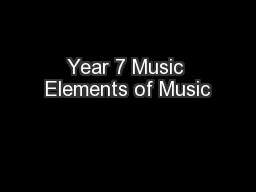PDF-7 Ways to Help with Your Child\'s Music Education
Author : keyboardlessons1 | Published Date : 2021-12-01
When children begin music lessons some parents have little music experience and feel unsure of their role As they wonder how to help parents have common questions
Presentation Embed Code
Download Presentation
Download Presentation The PPT/PDF document "7 Ways to Help with Your Child\'s Music ..." is the property of its rightful owner. Permission is granted to download and print the materials on this website for personal, non-commercial use only, and to display it on your personal computer provided you do not modify the materials and that you retain all copyright notices contained in the materials. By downloading content from our website, you accept the terms of this agreement.
7 Ways to Help with Your Child\'s Music Education: Transcript
Download Rules Of Document
"7 Ways to Help with Your Child\'s Music Education"The content belongs to its owner. You may download and print it for personal use, without modification, and keep all copyright notices. By downloading, you agree to these terms.
Related Documents














